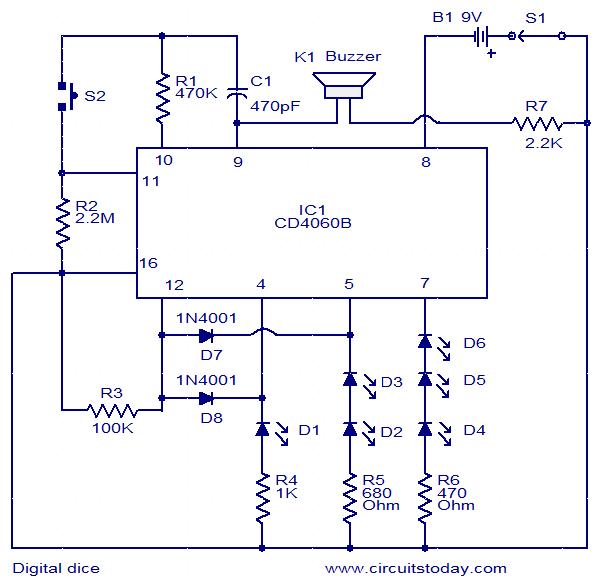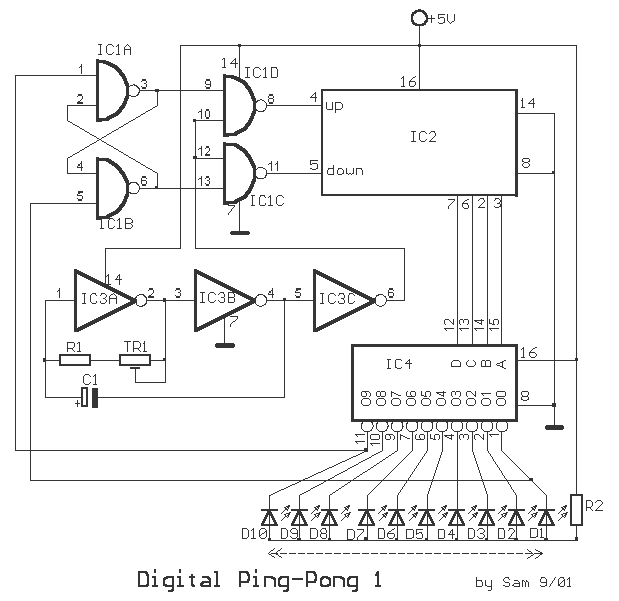Digital Dice Circuit

A2 to 4 Line Single Bit Decoder
Direction Finder Electronic Circuits

Digital Ping Pong Circuit

References:
http://www.google.com.ph/imgres?imgurl=http%3A%2F%2Fwww.circuitstoday.com%2Fwp-content%2Fuploads%2F2008%2F02%2Fstopwatch1.JPG&imgrefurl=http%3A%2F%2Fwww.circuitstoday.com%2Fcategory%2Fclockingtimecircuits&h=661&w=1300&tbnid=S8tSFw0vDFcZpM%3A&zoom=1&docid=AqxZef_cfTjYMM&ei=owoRVLiBForU8gXnooH4Dw&tbm=isch&ved=0CC4QMygAMAA&iact=rc&uact=3&dur=1286&page=1&start=0&ndsp=9
http://www.google.com.ph/imgres?imgurl=http%3A%2F%2Fwww.circuitstoday.com%2Fwp-content%2Fuploads%2F2009%2F06%2Fdigital-dice-circuit.jpg&imgrefurl=http%3A%2F%2Fwww.circuitstoday.com%2Fdigital-dice-circuit&h=583&w=605&tbnid=cdwGSLmc1AwbBM%3A&zoom=1&docid=56-xxYyLaeCyAM&ei=owoRVLiBForU8gXnooH4Dw&tbm=isch&ved=0CC8QMygBMAE&iact=rc&uact=3&dur=673&page=1&start=0&ndsp=9
http://www.google.com.ph/imgres?imgurl=http%3A%2F%2Fwww.ktclear.in%2Fuploads%2F25(1)Digital%252520Circuit%252520Technologies%252520and%252520Sequential%252520Circuits&imgrefurl=http%3A%2F%2Fwww.ktclear.in%2Fmockanswer%3Fmock_question%3DWhat%2520are%2520decoders%3F%25A0&h=735&w=1531&tbnid=vPAQ0XOLmNNGeM%3A&zoom=1&docid=ecc7DZ2fEPrOrM&ei=owoRVLiBForU8gXnooH4Dw&tbm=isch&ved=0CDIQMygEMAQ&iact=rc&uact=3&dur=673&page=1&start=0&ndsp=9
http://www.google.com.ph/imgres?imgurl=http%3A%2F%2Fwww.geocities.co.jp%2FTechnopolis-Mars%2F3335%2FProjects%2Fcompass%2Fcompass.gif&imgrefurl=http%3A%2F%2Fwww.discovercircuits.com%2FD%2Fdirection.htm&h=750&w=1000&tbnid=z3rB3aalebzQvM%3A&zoom=1&docid=md4vGHxdq2Jg-M&ei=owoRVLiBForU8gXnooH4Dw&tbm=isch&ved=0CDUQMygHMAc&iact=rc&uact=3&dur=514&page=1&start=0&ndsp=9
http://www.next.gr/uploads/303-341acaa462.gif










